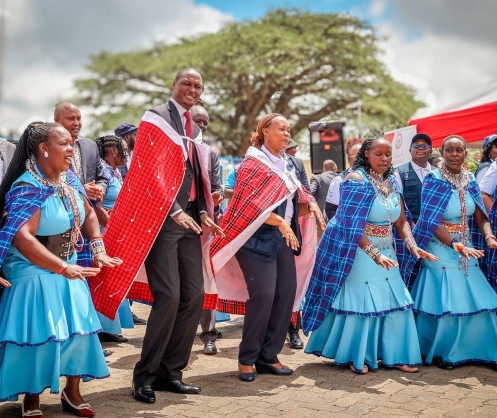WHO Kenya partnered with the Ministry of Health, Kajiado County leaders, health partners, and community members to celebrate World Health Day. This year’s theme is “Healthy Beginnings, Hopeful Futures,” focusing on efforts to end preventable maternal and newborn deaths while prioritizing women’s long-term health and well-being.
The event was led by Kajiado’s Deputy Governor, Hon. Martin Moshisho Martine, who praised the strong collaboration with WHO Kenya. In his remarks, Deputy Governor Martine highlighted the significant improvements the county has made in reproductive and maternal health. The number of service delivery points increased from 100 in 2018 to 134 in 2025, resulting in an increase in immunization coverage for children under one year from 78% to 95%. Furthermore, skilled deliveries in a safe environment rose from 64% in 2018 to 83% in 2024. There was also an increase in enrollment for the Social Health Insurance, which has brought services closer to mothers.
“We are proud of the progress made and are ready to do even more,” he stated.
Ms. Patricia Wamala, speaking on behalf of WHO Representative Dr. Abdourahmane Diallo, reminded everyone that “investing in maternal and newborn health is not a cost—it’s an investment in a healthier, more prosperous future.” She emphasized that the well-being of mothers and newborns is the foundation of healthy societies. “Let’s close the care gap and ensure every birth is safe and supported,” she urged.
Dr. Luigi D’Acquino, Chief of Health for UNICEF Kenya, also reaffirmed his organization’s commitment to the cause: “UNICEF stands with WHO and the Ministry of Health to ensure every child’s right to life is upheld. This year-long campaign on maternal and newborn health aligns with our core mission: protecting children’s rights from the very beginning,” he stated.
As part of the event, WHO Kenya donated 50 Mama Kits and 50 Dignity Kits to enhance the facility’s capacity to provide quality maternal and newborn services. Mama Kits contain essential items for mothers and newborns, while Dignity Kits support the hygiene needs of women and girls with items such as sanitary pads, soap, and personal care supplies. WHO Kenya staff also participated in cleaning the maternal and child health unit at the hospital, interacting with mothers, health care workers, and community members to listen to and learn from their experiences.
This World Health Day was not only a celebration but also a moment to reflect on progress and reaffirm collective efforts toward building a healthier future for all.

